
…As experts chart new path to intensify Takaful adoption
By David Akinmola
The National Insurance Commission (NAICOM) has said where conventional financial systems often fall short in addressing the multifaceted risks faced by individuals and communities, Islamic finance is capable of offering a new perspective rooted in ethical principles and social responsibility across African market.
This, the commission revealed at the 2nd edition of the African Takaful and Non-Interest (Islamic) Finance Conference themed: “Islamic Finance and Takaful; Building Resilience in a Volatile World.” in Lagos, saying as countries continue to navigate an era marked by economic volatility, environmental challenges, and social disruption, there is a need for innovative solutions is needed to expand the African market.
The Commissioner for Insurance, Olusegun Omosehin, who was represented by the Deputy Commissioner (Technical) Dr. Usman Jankara, said that while conventional financial systems often fall short in addressing the multifaceted risks faced by individuals and communities, Islamic finance offers a unique perspective rooted in ethical principles and social responsibility.
According to him, Islamic finance is not merely a set of financial products; it is a comprehensive system promoting fairness, transparency, and risk-sharing across the market.
Jankara noted that at its core, it encourages investors to consider the social, ethical, and environmental implications of their financial decisions and this holistic approach is particularly relevant today, where the consequences of financing extend beyond mere profit and loss.
However, it is driven by increasing demand for Shariah-compliant financial services, and Islamic finance in Nigeria is growing rapidly. The sector accounts for approximately 2-3% of Nigeria’s total financial market, valued at $3.8 billion. Sukuk dominates the market at 59.3%, followed by non-interest banks at 39.8%, and Islamic funds and Takaful at 0.9%.
“The Islamic financial industry comprises four non-interest finance banks, five Takaful companies, 15 microfinance institutions, and 10 non-bank financial institutions. Central to Islamic finance is the concept of Takaful, or Islamic insurance. Unlike conventional insurance, which often involves risk transfer and interest,
“Takaful is a Shariah-compliant form of insurance based on cooperation and shared responsibility. Participants contribute to a common fund, which is used to support those in need, fostering a sense of community and solidarity. In a world where climate change, health crises, and economic instability threaten our livelihoods, Takaful offers a resilient framework that provides not only financial protection but also a safety net that empowers individuals and communities to recover from adversities.” explained the Commissioner.
Omosehin, explains that by promoting risk-sharing and collective responsibility, Takaful helps mitigate the impact of unforeseen events, enabling families and businesses to bounce back more effectively.
The principles of Islamic finance and Takaful he noted are especially pertinent in enhancing resilience through risk mitigation, social justice, and sustainable development.
Speaking also at the conference, the Chairman of Noor Takaful Insurance Limited, Muhtar Bakare, observed that non-interest finance and Takaful have become the most tenable, time-tested, and culturally appropriate catalysts for change in Africa at a time when conventional finance has fallen short of meeting people’s basic needs.
Bakare said takaful and non-interest finance, which are rooted in the principles of solidarity, trust, equity, and risk sharing, remain the best models as they align seamlessly with the teachings of all three Abrahamic faiths and with the communal ethos of African societies.
According to him, Takaful presents alternative channels of financial mediation based on universally accepted principles that can accelerate financial inclusion well beyond Muslim communities.
He stated that the company was already providing access to affordable capital in underserved communities, catalysing the accumulation of savings, while encouraging prudent ethical investment.
“Our governance structure compels us to deliver services that are aligned with the aspirations of our host communities and to engage everyone with integrity, transparency, and respect. We’re not just profit maximising enterprises, we’re collaborative endeavours by all stakeholders working together to make our communities more just and equitable,” he said
He stated that he was confident that the conference would inspire new knowledge and foster new partnerships that would lead people out of poverty into prosperity and unlock Africa’s elusive potential.
Also speaking, the Vice Chairman of Noor Takaful Insurance, Aminu Tukur, said the second edition of the conference was held to deepen knowledge and educate people about Takaful, as it remains the only financial option that provides a fairer alternative.
Tukur noted that non-interest finance or takaful provides opportunities for transparency, accountability, empathy, and ethics, as opposed to what occurs in conventional finance.
“It is not just about making money or reporting a profit for the year but ensuring that everybody is carried along. For our takaful model, we have our participants who are part of our company. Under the model, they get from our underwriting profit. The same thing happened with alternative finance; people are more comfortable because there is transparency and accountability. More than ever before, we need organisations to ensure that people have all the support they can get,’ he said.
He further stressed that the Takaful industry has witnessed considerable growth in Nigeria, adding that Noor Takaful alone has recorded 15,000 participants and paid N9 billion in claims on a timely basis.
The two-day event also featured panel sessions involving a representative from the United Nations and leading insurance experts who provided insights on expanding Takaful insurance portfolios, sustainable financing, technology, crypto currency, research and development, and the use of Takaful in environmental sustainability.






